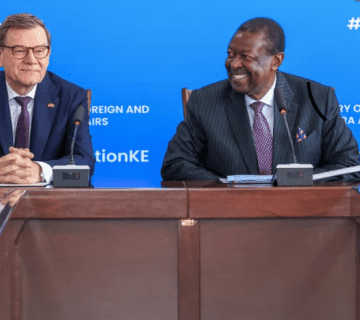Ethnic and racial prejudices are not natural traits. These are learned behaviors that manifest themselves in different forms such as violence, destruction of property, and/or full-blown civil war. Left unchecked, they can tear apart the social fabric, break national cohesion, and destroy a country. Advances in technology have enabled individuals to express their prejudices online, especially in social media platforms. Commenting on racial slurs posted on the doors of five black students at the United States Air Force Academy, Colorado Senator, Michael Bennett, said, “Hateful acts stand contrary to everything that makes us strong as a nation.”
The advent of disruptive technology, and more so mobile telephony, has exacerbated the spread of hatred and vitriol among Kenyans. In Kenya, Twitter and Facebook are the most popular social networking sites. Thousands of videos and pictures are shared daily. In Kenya, social media has been widely used by some individuals to incite ethnic prejudice. This bias manifests outwardly later on.
According to statistics from the Communications Authority of Kenya, mobile penetration reached 90 per cent of Kenyans (as of June 2016). Mobile subscriptions peaked at 39.7 million in the same period. Michael Joseph, the former Safaricom CEO, was once quoted saying “Kenya is a talking nation.” This was informed by the time Kenyans spend on the phone talking, texting, and on the internet. This is also indicative of time Kenyans spent on social media which is now a favorite pastime. Due to its wide and spontaneous reach, it has become the preferred new battlefield for hate mongers and ethnic chauvinists.
Social media is one of the largest ungoverned spaces in Kenya with no concrete enforceable regulatory framework. Here, ethnic prejudice and or negative profiling have found a home. In this space, hate language, ethnic prejudice, and profiling spread fast. In other words, social media is the new ‘underground.’ The issue is made worse by copies and shares by techno-savvy Kenyans who repost hate material even if the original is removed by the person who initially posted it. Fake information gets shared widely and freely. To the ordinary Kenyan, such information is gospel truth and tends to whip up emotions. The creators of this ethnic profiling wait for the opportune time to transform the hatred into action. It is important to note, however, that social media is not the only means by which negative profiling is being propagated. Mainstream media, open rallies, social groups, and political gatherings have also been used to preach ethnic hatred. This fast developing trend must be nipped in the bud before it becomes an irrepressible monster.
There are many institutions whose responsibility is to set and maintain national standards of acceptable behavior. Others have a duty to police all spaces and control deviant behavior. These include religious organizations, the National Cohesion and Integration Commission (NCIC), the Kenya Police Service, and schools. These institutions must develop curriculum to inculcate tolerance and mutual respect for cultural and political diversity. This monster has to be confronted head-on at all levels of leadership and denounced as unacceptable. Leaders ought to focus on the bigger picture – national integrity and cohesion. These aspects should remain as the pillars of defence against ethnic hatred while tolerating ethnic warfare in the social media and other platforms.
In addition, the panacea to social media hatred that leads to ethnic prejudice and profiling lies for the most part, with the leadership of the country. All levels of leadership irrespective of the rank, opposition or government, should foster nationalism and publicly denounce hate speech in all its forms. True nationalism is “fundamental unit for human social life, and takes precedence over any other social and political principles.” As such, leaders should always foster unity rather than division among the citizens. Additionally, there is a need for legislation to check and control hateful behavior, with stiff penalties for offenders.
Brig Gen (Rtd) George G. Kabugi was a Defence and Security expert at the HORN Institute.



